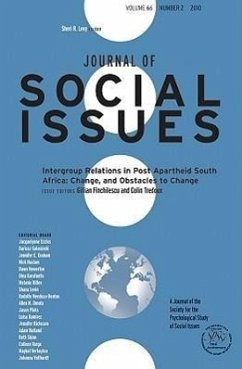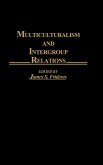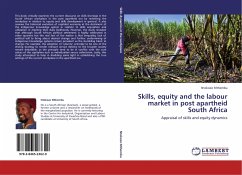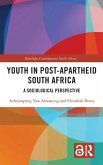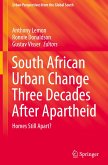Intergroup Relations in Post Apartheid South Africa
Change, and Obstacles to Change
Herausgeber: Finchilescu, Gillian; Levy, Sheri R; Tredoux, Colin
Intergroup Relations in Post Apartheid South Africa
Change, and Obstacles to Change
Herausgeber: Finchilescu, Gillian; Levy, Sheri R; Tredoux, Colin
- Broschiertes Buch
- Merkliste
- Auf die Merkliste
- Bewerten Bewerten
- Teilen
- Produkt teilen
- Produkterinnerung
- Produkterinnerung
This volume brings together research that has investigated change and obstacles to change in intergroup relations in South Africa. * Reflects on theories of intergroup behavior that are current in the international literature. * Highlights issues of interest when considering a transformation in which the formerly subordinate group becomes the politically dominant majority.
Andere Kunden interessierten sich auch für
![Multiculturalism and Intergroup Relations Multiculturalism and Intergroup Relations]() James FrideresMulticulturalism and Intergroup Relations70,99 €
James FrideresMulticulturalism and Intergroup Relations70,99 €![Zionist Israel and Apartheid South Africa Zionist Israel and Apartheid South Africa]() Amneh BadranZionist Israel and Apartheid South Africa187,99 €
Amneh BadranZionist Israel and Apartheid South Africa187,99 €![Skills, equity and the labour market in post apartheid South Africa Skills, equity and the labour market in post apartheid South Africa]() Ntokozo MthembuSkills, equity and the labour market in post apartheid South Africa39,99 €
Ntokozo MthembuSkills, equity and the labour market in post apartheid South Africa39,99 €![Psychiatry, Mental Institutions, and the Mad in Apartheid South Africa Psychiatry, Mental Institutions, and the Mad in Apartheid South Africa]() Tiffany Fawn JonesPsychiatry, Mental Institutions, and the Mad in Apartheid South Africa196,99 €
Tiffany Fawn JonesPsychiatry, Mental Institutions, and the Mad in Apartheid South Africa196,99 €![Rethinking Higher Education in Post-Apartheid South Africa Rethinking Higher Education in Post-Apartheid South Africa]() Rethinking Higher Education in Post-Apartheid South Africa179,99 €
Rethinking Higher Education in Post-Apartheid South Africa179,99 €![Youth in Post-Apartheid South Africa Youth in Post-Apartheid South Africa]() Acheampong Yaw AmoatengYouth in Post-Apartheid South Africa168,99 €
Acheampong Yaw AmoatengYouth in Post-Apartheid South Africa168,99 €![South African Urban Change Three Decades After Apartheid South African Urban Change Three Decades After Apartheid]() South African Urban Change Three Decades After Apartheid106,99 €
South African Urban Change Three Decades After Apartheid106,99 €-
-
-
This volume brings together research that has investigated change and obstacles to change in intergroup relations in South Africa. * Reflects on theories of intergroup behavior that are current in the international literature. * Highlights issues of interest when considering a transformation in which the formerly subordinate group becomes the politically dominant majority.
Produktdetails
- Produktdetails
- Verlag: Wiley
- Seitenzahl: 200
- Erscheinungstermin: 29. Juni 2010
- Englisch
- Abmessung: 226mm x 150mm x 15mm
- Gewicht: 295g
- ISBN-13: 9781444338188
- ISBN-10: 1444338188
- Artikelnr.: 35370697
- Herstellerkennzeichnung
- Libri GmbH
- Europaallee 1
- 36244 Bad Hersfeld
- gpsr@libri.de
- Verlag: Wiley
- Seitenzahl: 200
- Erscheinungstermin: 29. Juni 2010
- Englisch
- Abmessung: 226mm x 150mm x 15mm
- Gewicht: 295g
- ISBN-13: 9781444338188
- ISBN-10: 1444338188
- Artikelnr.: 35370697
- Herstellerkennzeichnung
- Libri GmbH
- Europaallee 1
- 36244 Bad Hersfeld
- gpsr@libri.de
Gillian Finchilescu is Chair of Psychology at the University of the Witwatersrand, Johannesburg, South Africa.?She obtained her D.Phil. from Oxford University. Her research interest is intergroup relations, with a recent focus on issues around intergroup contact and the reduction on intergroup hostility. Colin Tredoux is Professor of Psychology at the University of Cape Town (UCT), South Africa.?He obtained his Ph.D. degree in 1996, from UCT.?His interests in social psychology include the micro-ecology of contact, naturalistic study of intergroup contact, and classic contact theory.
OVERVIEW AND INTRODUCTION.
1 The Changing Landscape of Intergroup Relations in South Africa.
CHANGES IN IDENTITIES AND ATTITUDES.
2. Emerging Patterns of Social Identification in Post apartheid South
Africa.
3. Racial Reconciliation in South Africa: Interracial Contact and Changes
over Time.
4. Racial Contact and Change in South Africa.
MEDIATORS OF CONTACT.
5. Mediators of the Contact-Prejudice Relation amongst South African
Students on Four University Campuses.
6. The Impact of Cross group Friendships in South Africa: Affective
Mediators and Multigroup Comparisons.
7. Intergroup Anxiety in Interracial Interaction: The Role of Prejudice and
Metastereotypes.
CONTACT IN DESEGREGATED EDUCATIONAL INSTITUTIONS.
8. The Reconstitution of Privilege: Integration in Former White Schools in
South Africa.
9. The Spaces between Us: A Spatial Analysis of Informal Segregation at a
South African University.
CHALLENGES FOR THE CONTACT HYPOTHESIS.
10. Contact Theory: Too Timid for "Race" and Racism.
11. A Paradox of Integration? Interracial Contact, Prejudice Reduction, and
Perceptions of Racial Discrimination.
AFTERWORD.
Commentary: South African Contributions to the Study of Intergroup
Relations.
1 The Changing Landscape of Intergroup Relations in South Africa.
CHANGES IN IDENTITIES AND ATTITUDES.
2. Emerging Patterns of Social Identification in Post apartheid South
Africa.
3. Racial Reconciliation in South Africa: Interracial Contact and Changes
over Time.
4. Racial Contact and Change in South Africa.
MEDIATORS OF CONTACT.
5. Mediators of the Contact-Prejudice Relation amongst South African
Students on Four University Campuses.
6. The Impact of Cross group Friendships in South Africa: Affective
Mediators and Multigroup Comparisons.
7. Intergroup Anxiety in Interracial Interaction: The Role of Prejudice and
Metastereotypes.
CONTACT IN DESEGREGATED EDUCATIONAL INSTITUTIONS.
8. The Reconstitution of Privilege: Integration in Former White Schools in
South Africa.
9. The Spaces between Us: A Spatial Analysis of Informal Segregation at a
South African University.
CHALLENGES FOR THE CONTACT HYPOTHESIS.
10. Contact Theory: Too Timid for "Race" and Racism.
11. A Paradox of Integration? Interracial Contact, Prejudice Reduction, and
Perceptions of Racial Discrimination.
AFTERWORD.
Commentary: South African Contributions to the Study of Intergroup
Relations.
OVERVIEW AND INTRODUCTION.
1 The Changing Landscape of Intergroup Relations in South Africa.
CHANGES IN IDENTITIES AND ATTITUDES.
2. Emerging Patterns of Social Identification in Post apartheid South
Africa.
3. Racial Reconciliation in South Africa: Interracial Contact and Changes
over Time.
4. Racial Contact and Change in South Africa.
MEDIATORS OF CONTACT.
5. Mediators of the Contact-Prejudice Relation amongst South African
Students on Four University Campuses.
6. The Impact of Cross group Friendships in South Africa: Affective
Mediators and Multigroup Comparisons.
7. Intergroup Anxiety in Interracial Interaction: The Role of Prejudice and
Metastereotypes.
CONTACT IN DESEGREGATED EDUCATIONAL INSTITUTIONS.
8. The Reconstitution of Privilege: Integration in Former White Schools in
South Africa.
9. The Spaces between Us: A Spatial Analysis of Informal Segregation at a
South African University.
CHALLENGES FOR THE CONTACT HYPOTHESIS.
10. Contact Theory: Too Timid for "Race" and Racism.
11. A Paradox of Integration? Interracial Contact, Prejudice Reduction, and
Perceptions of Racial Discrimination.
AFTERWORD.
Commentary: South African Contributions to the Study of Intergroup
Relations.
1 The Changing Landscape of Intergroup Relations in South Africa.
CHANGES IN IDENTITIES AND ATTITUDES.
2. Emerging Patterns of Social Identification in Post apartheid South
Africa.
3. Racial Reconciliation in South Africa: Interracial Contact and Changes
over Time.
4. Racial Contact and Change in South Africa.
MEDIATORS OF CONTACT.
5. Mediators of the Contact-Prejudice Relation amongst South African
Students on Four University Campuses.
6. The Impact of Cross group Friendships in South Africa: Affective
Mediators and Multigroup Comparisons.
7. Intergroup Anxiety in Interracial Interaction: The Role of Prejudice and
Metastereotypes.
CONTACT IN DESEGREGATED EDUCATIONAL INSTITUTIONS.
8. The Reconstitution of Privilege: Integration in Former White Schools in
South Africa.
9. The Spaces between Us: A Spatial Analysis of Informal Segregation at a
South African University.
CHALLENGES FOR THE CONTACT HYPOTHESIS.
10. Contact Theory: Too Timid for "Race" and Racism.
11. A Paradox of Integration? Interracial Contact, Prejudice Reduction, and
Perceptions of Racial Discrimination.
AFTERWORD.
Commentary: South African Contributions to the Study of Intergroup
Relations.

